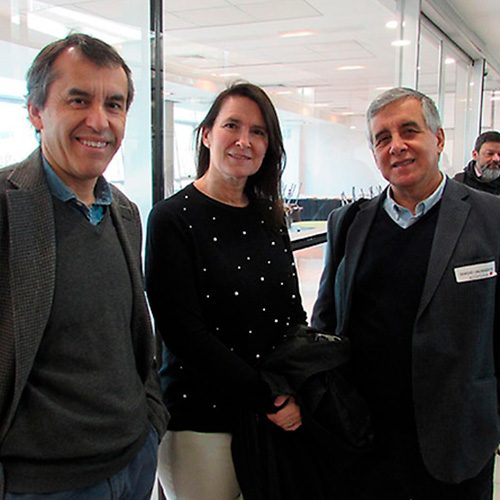They organize the first multidisciplinary meeting of Centers of Excellence in Chile

The first meeting of Chile's Centres of Excellence featured a series of panels covering subjects such as the challenges around interdisciplinary work in the academy, and the collaboration between these kinds of agencies. Activity, that allowed the discussion and exchange of experiences among participants, involving more than 45 researchers from 19 national research centres, as well as authorities of the Ministry of Science, Technology, Knowledge and Innovation and the National Science and Technology Commission (CONICYT).
The opening of the day was in charge of Carolina Torrealba, Undersecretary of Science, Technology, Knowledge and innovation. In his speech, authority referred to the diversity and complexity of the Centres of Excellence. "There are few elements of public policy that have changed as much as we do research in Chile. Since the installation of the Centres of Excellence,, the landscape of scientific research changed. I think the most fundamental thing they gave us was to change the scope and ambition of the research questions (…) It gave us a chance of more risk".
Torrealba invited further work on interdiscipline and think about what the second stage of the Centers would look like, once your funding is finished. In this respect, Dante Contreras, director and principal investigator of the Center for Conflict Studies and Social Cohesion at the University of Chile (COES), invited attendees to build cooperation partnerships.
"Interdiscipline: opportunities and challenges for academia" was the title of the first panel, which was composed by Valentina Paredes, COES researcher and the Millennium Social Development Core (DESOC); Paola Jirón, Director of the Millennium Mobility and Territories (Movyt) University of Chile; and Rodrigo Cienfuegos, director of the National Research Center for Integrated Natural Disaster Management (CIGIDEN).
In this instance, Valentina Paredes, professor at the Faculty of Economics and Business of the University of Chile, called for thinking about how researchers are encouraging interdiscipline and rethinking literature delivered in the classroom. On the other hand, Paola Jirón, who is also a professor at the Faculty of Architecture and Urbanism of the Casa de Bello, focused the discussion around the territory, mobility and inequality, and warned that one of the challenges is "not to lose the discipline of origin and incorporate elements of other disciplines into what one is doing". Finally, Rodrigo Cienfuegos, associate professor in the Department of Hydraulic and Environmental Engineering at the Catholic University, channeled the conversation into the combination between engineering and social sciences, warning of the difficulties between technocracy and academia.
On the second panel, entitled "Collaboration between centres", Catterina Ferreccio researchers participated, Deputy Director of the Center for Advanced Chronic Disease Studies (ACCDiS ); and Maite de Cea, principal investigator at the Fondap Center for Intercultural and Indigenous Studies (CIIR) and director of the Social Science Research Institute of Diego Portales University. This panel was moderated by Matías Garretón, COES associate researcher and academic at the Center for Territorial Intelligence (Cit) Adolfo Ibáñez University.
For Juan Carlos Castillo, University of Chile academic, is a requirement to talk about open science when discussing collaboration between the Centers of Excellence, because this "comes from a crisis in the scientific work associated with the closure (data) science".
For him, "there's a great monster that's been created by the pressure to publish. It is necessary to share the elements of the research before publication, because by following the times of academic journals, time is often wasted when another or another academic might have taken the job's findings into another new initiative".
On the other hand, Catterina Ferreccio, PUC academic, stressed that changes in evaluation criteria would help to promote academic production across different disciplines and; while Maite de Cea, as Director of the Social Scienceresearch Institute (ICSO) Diego Portales University, commented that it should not be worked only at the level of study centres, but also at the level of universities and other social actors. "At CIIR we work on intercultural relations with indigenous people. Our daily actor is indigenous peoples and communities. For us, that difficulty is our daily. The ISI paper and all indicators are always on the radar, but our investigative work has to do with how we relate and collaborate with indigenous peoples", Added.
This activity was attended by Carolina Torrealba, Undersecretary of Science, Technology, Knowledge and Innovation of Chile; Maria Eugenia Camelio, director of the Funding Fund for Research Centres in Priority Areas (FONDAP); Alejandra Vidales, director of the National Fund for Scientific and Technological Development (FONDECYT); Mariana Krause, Board of the National Science and Technology Commission (CONICYT); Sergio launderers, director of the Association Research Program (PIA) Conicyt and also director and principal investigator of the Advanced Chronic Diseases Center (ACCDiS ); and the presence of more than 45 researchers from 19 centres in the country.
